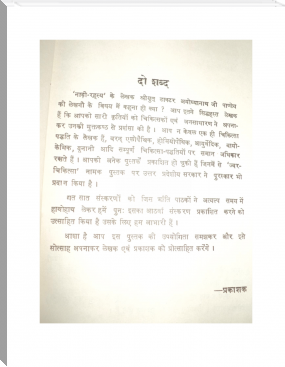LYSBETH, H. RIDER HAGGARD [brene brown rising strong txt] 📗

- Author: H. RIDER HAGGARD
Book online «LYSBETH, H. RIDER HAGGARD [brene brown rising strong txt] 📗». Author H. RIDER HAGGARD
Adrian had been borne away, and for a little while there was silence. Then, none commanding him, but as though an instinct pushed him forward, Red Martin began to move up the length of the long room, half dragging, half carrying his captive Ramiro. It was as if some automaton had suddenly been put in motion, some machine of gigantic strength that nothing could stop. The man in his grip set his heels in the floor and hung back, but Martin scarcely seemed to heed his resistance. On he came, and the victim with him, till they stood together before the oaken chair and the stern-faced, white-haired woman who sat in it, her cold countenance lit by the light of the two candles. She looked and shuddered. Then she spoke, asking:
"Why do you bring this man to me, Martin?"
"For judgment, Lysbeth van Goorl," he answered.
"Who made me a judge over him?" she asked.
"My master, Dirk van Goorl, your son, Adrian, and Hendrik Brant. Their blood makes you judge of his blood."
"I will have none of it," Lysbeth said passionately, "let the people judge him." As she spoke, from the crowd in the street below there swelled a sudden clamour.
"Good," said Martin, "the people shall judge," and he began to turn towards the window, when suddenly, by a desperate effort, Ramiro wrenched his doublet from his hand, and flung himself at Lysbeth's feet and grovelled there.
"What do you seek?" she asked, drawing back her dress so that he should not touch it.
"Mercy," he gasped.
"Mercy! Look, son and daughter, this man asks for mercy who for many a year has given none. Well, Juan de Montalvo, take your prayer to God and to the people. I have done with you."
"Mercy, mercy!" he cried again.
"Eight months ago," she said, "I uttered that prayer to you, begging of you in the Name of Christ to spare the life of an innocent man, and what was your answer, Juan de Montalvo?"
"Once you were my wife," he pleaded; "being a woman, does not that weigh with you?"
"Once he was my husband, being a man did that weigh with you? The last word is said. Take him, Martin, to those who deal with murderers."
Then that look came upon Montalvo which twice or thrice before Lysbeth has seen written in his face--once when the race was run and lost, and once when in after years she had petitioned for the life of her husband. Lo! it was no longer the face of a man, but such a countenance as might have been worn by a devil or a beast. The eyeball started, the grey moustache curled upwards, the cheek-bones grew high and sharp.
"Night after night," he gasped, "you lay at my side, and I might have killed you, as I have killed that brat of yours--and I spared you, I spared you."
"God spared me, Juan de Montalvo, that He might bring us to this hour; let Him spare you also if He will. I do not judge. He judges and the people," and Lysbeth rose from her chair.
"Stay!" he cried, gnashing his teeth.
"No, I stay not, I go to receive the last breath of him you have murdered, my son and yours."
He raised himself upon his knees, and for a moment their eyes met for the last time.
"Do you remember?" she said in a quiet voice, "many years ago, in this very room, after you had bought me at the cost of Dirk's life, certain words I spoke to you? Now I do not think that it was I who spoke, Juan de Montalvo."
And she swept past him and though the wide doorway.
Red Martin stood upon the balcony gripping the man Ramiro. Beneath him the broad street was packed with people, hundreds and thousands of them, a dense mass seething in the shadows, save here and again where a torch or a lantern flared showing their white faces, for the moon, which shone upon Martin and his captive, scarcely reached those down below. As gaunt, haggard, and long-haired, he stepped upon the balcony, they saw him and his burden, and there went up such a yell as shook the very roofs of Leyden. Martin held up his hand, and there was silence, deep silence, through which the breath of all that multitude rose in sighs, like the sighing of a little wind.
"Citizens my Leyden, my masters," the Frisian cried, in a great, deep voice that echoed down the street, "I have a word to say to you. This man here--do you know him?"
Back came an answering yell of "/Aye!/"
"He is a Spaniard," went on Martin, "the noble Count Juan de Montalvo, who many years past forced one Lysbeth van Hout of this city into a false marriage, buying her at the price of the life of her affianced husband, Dirk van Goorl, that he might win her fortune."
"We know it," they shouted.
"Afterwards he was sent to the galleys for his crimes. He came back, and was made Governor of the Gevangenhuis by the bloody Alva, where he brought to death your brother and past burgomaster, Dirk van Goorl. Afterwards he kidnapped the person of Elsa Brant, the daughter of Hendrik Brant, whom the Inquisition murdered at The Hague. We rescued her from him, my master, Foy van Goorl, and I. Afterwards he served with the Spaniards as a captain of their forces in the siege of Haarlem yonder--Haarlem that fell three days ago, and whose citizens they are murdering to-night, throwing them two by two to drown in the waters of the Mere."
"Kill him! Cast him down!" roared the mob. "Give him to us, Red Martin."
Again the Frisian lifted his hand and again there was silence; a sudden, terrible silence.
"This man had a son; my mistress, Lysbeth van Goorl, to her shame and sorrow, was the mother of him. That son, repenting, saved us from the sack of Haarlem, yea, through him the three of us, Foy van Goorl, Elsa Brant, and I, Martin Roos, their servant, are alive to-night. This man and his Spaniards overtook us on the lake, and there we conquered him by the help of Martha the Mare, Martha whom they made to carry her own husband to the fire. We conquered him, but she--she died in the fray; they stabbed her to death in the water as men stab an otter. Well, that son, the Heer Adrian, he was murdered in the boat with a knife- blow given by his own father from behind, and he lies here in this house dead or dying.
"My master and I, we brought this man, who to-day is called Ramiro, to be judged by the woman whose husband and son he slew. But she would not judge him; she said, 'Take him to the people, let them judge.' So judge now, ye people," and with an effort of his mighty strength Martin swung the struggling body of Ramiro over the parapet of the balcony and let him hang there above their heads.
They yelled, they screamed in their ravenous hate and rage; they leapt up as hounds leap at a wolf upon a wall.
"Give him to us, give him to us!" that was their cry.
Martin laughed aloud. "Take him then," he said; "take him, ye people, and judge him as you will," and with one great heave he hurled the thing that writhed between his hands far out into the centre of the street.
The crowd below gathered themselves into a heap like water above a boat sinking in the heart of a whirlpool. For a minute or more they snarled and surged and twisted. Then they broke up and went away, talking in short, eager sentences. And there, small and dreadful on the stones, lay something that once had been a man.
Thus did the burghers of Leyden pass judgment and execute it upon that noble Spaniard, the Count Juan de Montalvo.
CHAPTER XXX(TWO SCENES)
/Scene the First/
Some months had gone by, and Alkmaar, that heroic little city of the north, had turned the flood of Spanish victory. Full of shame and rage, the armies of Philip and of Valdez marched upon Leyden, and from November, 1573, to the end of March, 1574, the town was besieged. Then the soldiers were called away to fight Louis of Nassau, and the leaguer was raised till, on the fatal field of Mook Heath, the gallant Louis, with his brother Henry and four thousand of their soldiers, perished, defeated by D'Avila. Now once more the victorious Spaniards threatened Leyden.
In a large bare room of the Stadthuis of that city, at the beginning of the month of May, a man of middle-age might have been seen one morning walking up and down, muttering to himself as he walked. He was not a tall man and rather thin in figure, with brown eyes and beard, hair tinged with grey, and a wide brow lined by thought. This was William of Orange, called the Silent, one of the greatest and most noble of human beings who ever lived in any age; the man called forth by God to whom Holland owes its liberties, and who for ever broke the hideous yoke of religious fanaticism among the Teuton races.
Sore was his trouble on this May morning. But last month two more of his brothers had found death beneath the sword of the Spaniard, and now this same Spaniard, with whom he had struggled for all these weary years, was marching in his thousands upon Leyden.
"Money," he was muttering to himself. "Give me money, and I will save the city yet. With money ships can be built, more men can be raised, powder can be bought. Money, money, money--and I have not a ducat! All gone, everything, even to my mother's trinkets and the plate upon my table. Nothing is left, no, not the credit to buy a dozen geldings."
As he thought thus one of his secretaries entered the room.
"Well, Count," said the Prince, "have you been to them all?"
"Yes, sir."
"And with what success?"
"The burgomaster, van de Werff, promises to do everything he can, and will, for he is a man to lean on, but money is short. It has all left the country and there is not much to get."
"I know it," groaned Orange, "you can't make a loaf from the crumbs beneath the table. Is the proclamation put up inviting all good citizens to give or lend in this hour of their country's need?"
"Yes, sir."
"Thank you, Count, you can go; there is nothing more to do. We will ride for Delft to-night."
"Sir," said the secretary, "there are two men in the courtyard who wish to see you."
"Are they known?"
"Oh yes, perfectly. One is Foy van Goorl, who went through the siege of Haarlem and escaped, the son of the worthy burgher, Dirk van Goorl, whom





Comments (0)